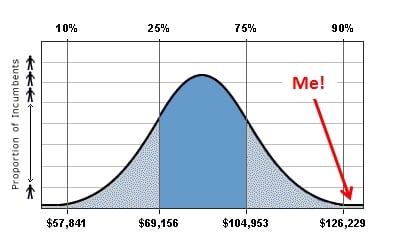A reader may be underpaid but doesn’t really know. Let’s explore how to find out in the August 25, 2020 Ask The Headhunter Newsletter.
Question
I want to change jobs because I suspect I’m underpaid. I’ve been looking at Glassdoor and other salary surveys. Are they accurate? How can I find out what salary I should expect from a new job, so that I can figure out if I am currently underpaid, as I contend, or if I should stop my whining?
Nick’s Reply
We live and work in a quasi-capitalist environment. For the most part, the market determines value. So put yourself on the block and see what kinds of bids you get. Seriously.
Do surveys say you’re underpaid?
Salary surveys are usually either out of date, or they are naturally biased toward the mean. That is, they survey people who want to be surveyed and they emphasize the value of the average worker. They’re not good at explaining why people on the leading edge of the curve are paid what they are paid. (See Glassdoor Salary Data: Worse than useless.)
Trying to look up a job title that fits you in a salary survey is like trying to find a job ad that matches you exactly. You’re not likely to learn much about your individual worth from either.
Surveys don’t predict individual value
You don’t say what work you do or what industry you’re in, but you seem to suggest salaries in your field are increasing while yours is not. Does it matter? Does it mean you will get a bigger raise or a bump in salary to change jobs? Asking me what you’re worth is as good as consulting the salary oracles — not very! While a survey may be useful in understanding trends, it does not predict salary for any individual. That means you.
Short of putting yourself on the block, I think the next best way to get an idea of your value in the market is to talk to real, live people in your field.
Ask your peers
Get the information you seek straight from the horse’s mouth. Meet these people through professional associations, at industry meetings, through industry publications and at training courses outside your company — and, of course, in relevant online professional communities. In other words, discuss compensation issues directly with people who are not under your company’s control so you can form a better picture of what your compensation could look like.
(I am not suggesting blasting messages to 50 people with your job title on LinkedIn and asking how much they earn. I prefer venues where you’ll have to earn your reputation and credentials before you’ll get any really useful information.)
Of course, some people won’t discuss their own salaries, but I find in general that people will talk about compensation in their field and share what they know about it. You’re far better off talking with others who do the kind of work you do simply because such dialogue is far richer than reviewing cold numbers from a survey.
If you’re not participating in your professional community this way, you’re making a big mistake. These are the folks who can help you figure out the value question, and perhaps help you find your next job. Don’t whine. Go mix it up with your peers!
This is a good exercise for all of us. We can’t ask questions of a data point on a salary survey. But we can ask one another.
How does anyone figure out what they’re worth? How do you figure it out? Does it change the way you handle your career? What advice would you give this reader about whether they’re underpaid?
: :





